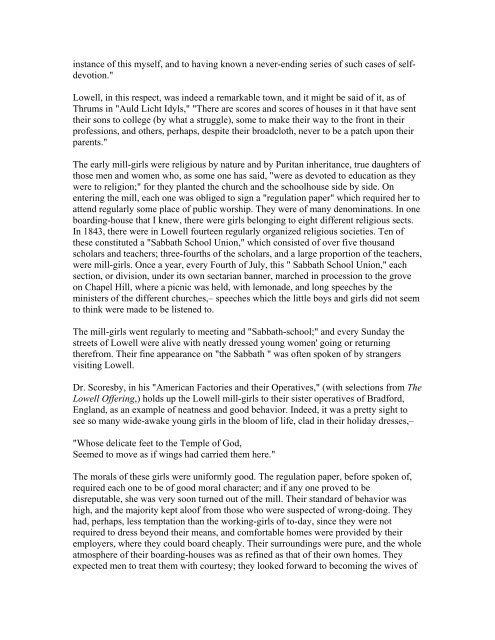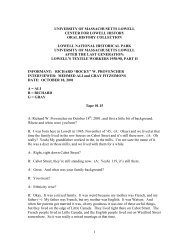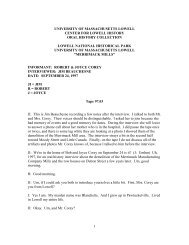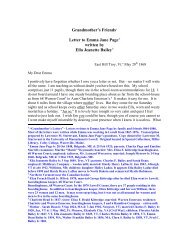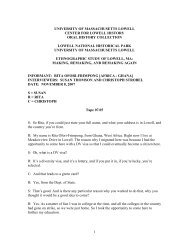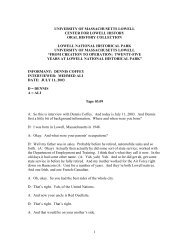LOOM AND SPINDLE OR Life Among the Early Mill Girls WITH A ...
LOOM AND SPINDLE OR Life Among the Early Mill Girls WITH A ...
LOOM AND SPINDLE OR Life Among the Early Mill Girls WITH A ...
You also want an ePaper? Increase the reach of your titles
YUMPU automatically turns print PDFs into web optimized ePapers that Google loves.
instance of this myself, and to having known a never-ending series of such cases of selfdevotion."<br />
Lowell, in this respect, was indeed a remarkable town, and it might be said of it, as of<br />
Thrums in "Auld Licht Idyls," "There are scores and scores of houses in it that have sent<br />
<strong>the</strong>ir sons to college (by what a struggle), some to make <strong>the</strong>ir way to <strong>the</strong> front in <strong>the</strong>ir<br />
professions, and o<strong>the</strong>rs, perhaps, despite <strong>the</strong>ir broadcloth, never to be a patch upon <strong>the</strong>ir<br />
parents."<br />
The early mill-girls were religious by nature and by Puritan inheritance, true daughters of<br />
those men and women who, as some one has said, "were as devoted to education as <strong>the</strong>y<br />
were to religion;" for <strong>the</strong>y planted <strong>the</strong> church and <strong>the</strong> schoolhouse side by side. On<br />
entering <strong>the</strong> mill, each one was obliged to sign a "regulation paper" which required her to<br />
attend regularly some place of public worship. They were of many denominations. In one<br />
boarding-house that I knew, <strong>the</strong>re were girls belonging to eight different religious sects.<br />
In 1843, <strong>the</strong>re were in Lowell fourteen regularly organized religious societies. Ten of<br />
<strong>the</strong>se constituted a "Sabbath School Union," which consisted of over five thousand<br />
scholars and teachers; three-fourths of <strong>the</strong> scholars, and a large proportion of <strong>the</strong> teachers,<br />
were mill-girls. Once a year, every Fourth of July, this " Sabbath School Union," each<br />
section, or division, under its own sectarian banner, marched in procession to <strong>the</strong> grove<br />
on Chapel Hill, where a picnic was held, with lemonade, and long speeches by <strong>the</strong><br />
ministers of <strong>the</strong> different churches,– speeches which <strong>the</strong> little boys and girls did not seem<br />
to think were made to be listened to.<br />
The mill-girls went regularly to meeting and "Sabbath-school;" and every Sunday <strong>the</strong><br />
streets of Lowell were alive with neatly dressed young women' going or returning<br />
<strong>the</strong>refrom. Their fine appearance on "<strong>the</strong> Sabbath " was often spoken of by strangers<br />
visiting Lowell.<br />
Dr. Scoresby, in his "American Factories and <strong>the</strong>ir Operatives," (with selections from The<br />
Lowell Offering,) holds up <strong>the</strong> Lowell mill-girls to <strong>the</strong>ir sister operatives of Bradford,<br />
England, as an example of neatness and good behavior. Indeed, it was a pretty sight to<br />
see so many wide-awake young girls in <strong>the</strong> bloom of life, clad in <strong>the</strong>ir holiday dresses,–<br />
"Whose delicate feet to <strong>the</strong> Temple of God,<br />
Seemed to move as if wings had carried <strong>the</strong>m here."<br />
The morals of <strong>the</strong>se girls were uniformly good. The regulation paper, before spoken of,<br />
required each one to be of good moral character; and if any one proved to be<br />
disreputable, she was very soon turned out of <strong>the</strong> mill. Their standard of behavior was<br />
high, and <strong>the</strong> majority kept aloof from those who were suspected of wrong-doing. They<br />
had, perhaps, less temptation than <strong>the</strong> working-girls of to-day, since <strong>the</strong>y were not<br />
required to dress beyond <strong>the</strong>ir means, and comfortable homes were provided by <strong>the</strong>ir<br />
employers, where <strong>the</strong>y could board cheaply. Their surroundings were pure, and <strong>the</strong> whole<br />
atmosphere of <strong>the</strong>ir boarding-houses was as refined as that of <strong>the</strong>ir own homes. They<br />
expected men to treat <strong>the</strong>m with courtesy; <strong>the</strong>y looked forward to becoming <strong>the</strong> wives of


